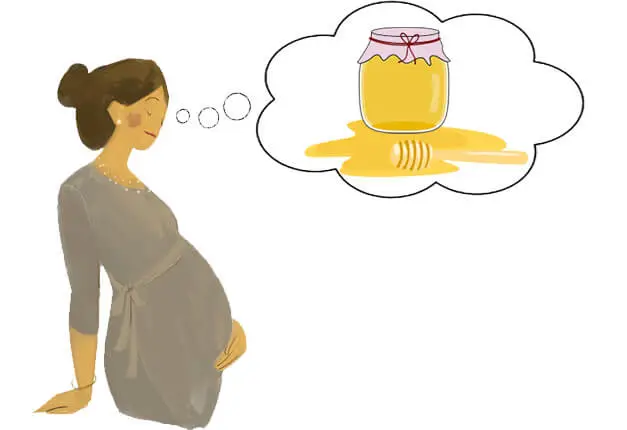Last updated: July 2025
Pregnancy-safe food tips.

Is Honey Safe During Pregnancy?
Yes, pasteurized honey is safe for pregnant women!
There is often confusion around this topic because babies under one year shouldn’t consume honey. That naturally raises concerns for expectant mothers as well.
Raw honey can sometimes contain spores of Clostridium botulinum, the bacteria that cause botulism. While an adult’s digestive system is well-equipped to handle these spores, a baby’s immature gut is not, which is why honey is off-limits for babies under 12 months.
Pregnancy doesn’t suddenly make your digestive system infant-like, but since your immune system is slightly more vulnerable during pregnancy, it’s smart to avoid raw honey and go for pasteurized honey instead.
From my own experience: During pregnancy, I chose pasteurized honey just to be safe. It gave me peace of mind while still enjoying something sweet and natural.
Raw Honey vs. Pasteurized Honey: What’s the Difference?
| Feature | Raw Honey | Pasteurized Honey |
|---|---|---|
| Processing | Minimally processed, not heated | Heated to high temperatures to kill bacteria and spores |
| Nutrient Content | Retains natural enzymes, vitamins, and antioxidants | May lose some enzymes during heating |
| Botulism Risk | Slightly higher due to possible spores | Extremely low to none |
| Safety in Pregnancy | ❌ Not recommended | ✅ Safe and recommended |
| Labeling Clarity | Often not clearly labeled | Usually labeled as “pasteurized” |
| Availability | Often local or artisanal sources | Common in supermarkets and mainstream brands |
⚠️ Always read the label! Not all honey jars are clearly marked. If you’re unsure, contact the brand or choose one from a reputable store.
What About Manuka Honey?
Manuka honey is a special type of honey from New Zealand, known for its high methylglyoxal (MGO) content, which gives it strong antibacterial properties.
Manuka honey can help relieve digestive problems, aid in the healing of minor wounds and skin issues, and boost your immune system.
Manuka honey is safe during pregnancy. However, like regular honey, it must be pasteurized. Luckily, this is the case with most commercial versions.
💡 Note: Authentic Manuka honey can be pricey and is often labeled with its MGO level—the higher the number, the stronger its antibacterial effect.
Benefits of Honey During Pregnancy
Pasteurized honey offers several potential benefits during pregnancy:
- Immune support: The antioxidants in honey help protect cells from damage and may lower the risk of various diseases. Some types, such as Manuka honey, also contain antibacterial properties that can help reduce the risk of illness.
- Soothes sore throat: Honey’s natural anti-inflammatory properties can soothe a sore throat.
- Energy boost: As a natural sweetener, honey provides a quick energy lift.
- Aids digestion: Honey can help regulate gut bacteria, supporting better digestion.
- Wound healing: Thanks to its antibacterial properties, honey can also be applied to wounds to aid in healing.
💡 Note: These benefits apply to pasteurized honey, not raw or unpasteurized varieties!
How Much Honey Is Safe During Pregnancy?
There are no strict guidelines, but moderation is key. One to two teaspoons per day is safe for most healthy pregnancies.
Be mindful if you:
- Have gestational diabetes or are watching your blood sugar
- Are prone to heartburn or acid reflux
- Take medication that may interact with natural products—always check with your healthcare provider!
Potential Risks of Honey in Pregnancy
While pasteurized honey is generally safe, here are some things to keep in mind:
- Raw honey risk: Avoid due to potential botulism spores!
- Allergic reactions: Some people are allergic to honey or pollen, and consuming honey could trigger an allergic response. If you’re allergic to pollen or bee products, skip it.
- High sugar content: Honey is still a sugar. Consuming too much can lead to weight gain and increase the risk of gestational diabetes.
- Interference with medication: Honey may interact with certain medications, potentially making them less effective. If you take medication, consult your doctor before consuming honey.
- Pesticide contamination: Honey can sometimes be contaminated with pesticides and heavy metals. Buying from reputable sources reduces this risk.
FAQs: Honey and Pregnancy
Final Thoughts about Honey in Pregnancy
Pregnancy is full of “can I eat this?” questions, and honey is one of the sweeter ones.
The bottom line? Stick to pasteurized honey, eat it in moderation, and always read the label. It’s a natural, delicious option for boosting immunity, soothing sore throats, and adding a little sunshine to your day.
Mama tip: When in doubt, talk to your healthcare provider. A little reassurance can go a long way.
Sources:
Disclaimer: This post is for informational purposes only and does not replace medical advice. Always consult your doctor or OB-GYN before making any changes to your diet or supplement routine while pregnant.
